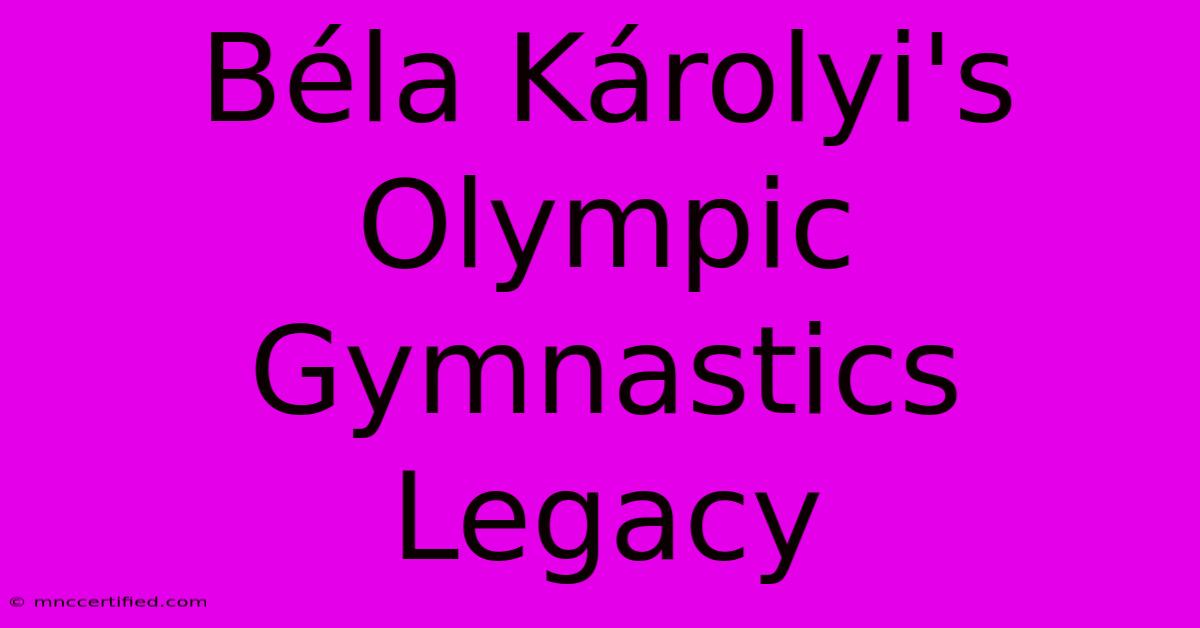Béla Károlyi's Olympic Gymnastics Legacy

Table of Contents
Béla Károlyi's Olympic Gymnastics Legacy: A Reign of Power, Precision, and Controversy
Béla Károlyi, a name synonymous with American gymnastics dominance, has left an undeniable mark on the sport. His coaching career, marked by both spectacular success and significant controversy, has shaped Olympic gymnastics for decades. This article delves into his legacy, exploring his revolutionary coaching methods, his impact on American gymnastics, and the criticisms that have shadowed his achievements.
The Károlyi Method: A Revolution in Gymnastics Training
Béla Károlyi, alongside his wife Márta, developed a rigorous and demanding training regime that pushed the boundaries of gymnastics preparation. Their "Károlyi Method" was characterized by:
- High-Intensity Training: Known for their grueling training schedules, the Károlyis pushed athletes to their physical and mental limits, fostering exceptional strength, flexibility, and skill.
- Emphasis on Perfection: They demanded flawless execution, striving for near-perfect routines, a hallmark of their gymnasts' performances.
- Early Specialization: The Károlyis focused on identifying and training young gymnasts from a very young age, shaping their bodies and techniques from a formative stage.
- Psychological Conditioning: Beyond physical training, the Károlyis understood the importance of mental fortitude. They instilled discipline, focus, and a winning mentality in their athletes.
This intense approach yielded incredible results, propelling American gymnasts to the forefront of international competition.
A Dynasty of Olympic Champions: Shaping American Gymnastics
The impact of Béla Károlyi on American gymnastics is undeniable. He coached numerous Olympic champions, including:
- Mary Lou Retton: The first American woman to win an all-around gold medal in the Olympics (1984). Her victory, largely attributed to Károlyi's coaching, sparked a revolution in American gymnastics.
- Nadia Comăneci: While not directly coached by Béla for her Olympic triumphs, Nadia Comăneci's pioneering perfect 10 scores, achieved under the Károlyi's coaching in Romania, laid the groundwork for the later American successes.
- Carly Patterson: The 2004 Olympic all-around champion, showcasing the continued success of the Károlyi method.
- Nastia Liukin: The 2008 Olympic all-around champion, further solidifying the Károlyi's legacy.
- Gabby Douglas: The 2012 Olympic all-around champion, demonstrating the lasting impact of the Károlyi's training philosophy.
These athletes, and many others trained under his tutelage, represent a golden age for American women's gymnastics, a period largely shaped by Béla Károlyi's influence. His coaching established the United States as a dominant force in the sport on the world stage.
Controversy and Criticism: A Darker Side to Success
Despite his undeniable success, Béla Károlyi's coaching methods have faced considerable criticism, raising ethical questions about his training regime:
- Allegations of Abuse: Serious allegations of emotional and physical abuse have been leveled against Béla and Márta Károlyi. These accusations, though never definitively proven in court, have cast a long shadow over their legacy. Investigations and testimonies from former gymnasts have highlighted a demanding and potentially harmful environment.
- Control and Manipulation: The Károlyis' controlling nature and intense focus on results have been criticized for creating a potentially toxic and unhealthy atmosphere for young athletes.
- Emphasis on Weight and Appearance: Concerns have been raised regarding the Károlyis' emphasis on gymnasts' weight and body image, potentially contributing to eating disorders and other mental health issues.
A Complex Legacy: Success and Scars
Béla Károlyi's legacy is undeniably complex. His contributions to American gymnastics are undeniable, elevating the sport to unprecedented heights. However, the allegations of abuse and the criticisms surrounding his coaching methods cannot be ignored. His story serves as a reminder that success should never come at the cost of the well-being of athletes, and a thorough examination of the ethical implications of high-performance training is crucial. Understanding his impact requires acknowledging both the extraordinary achievements and the serious concerns surrounding his coaching practices. The full story of Béla Károlyi is one of both triumph and tragedy, a legacy that continues to be debated and re-evaluated.

Thank you for visiting our website wich cover about Béla Károlyi's Olympic Gymnastics Legacy. We hope the information provided has been useful to you. Feel free to contact us if you have any questions or need further assistance. See you next time and dont miss to bookmark.
Featured Posts
-
Georgia Defeats Tennessee Live Game Updates
Nov 17, 2024
-
Bucks Loss Pool Report Reveals Officiating Mistake
Nov 17, 2024
-
Monthly Return On 400k Investment
Nov 17, 2024
-
Australia Wins Second T20 Against Pakistan
Nov 17, 2024
-
Lillard Middleton Injury Bucks Game Preview
Nov 17, 2024